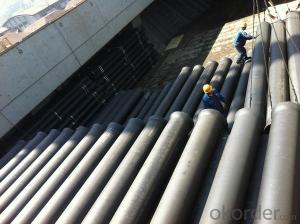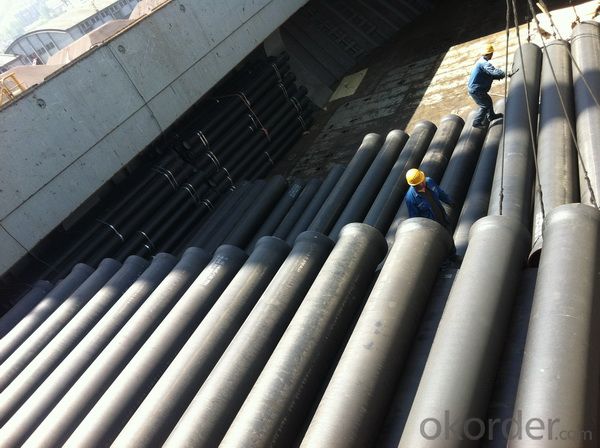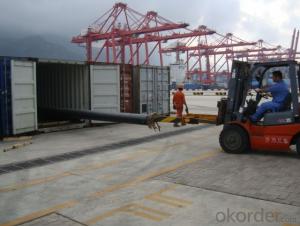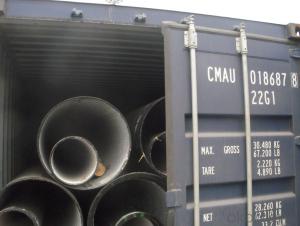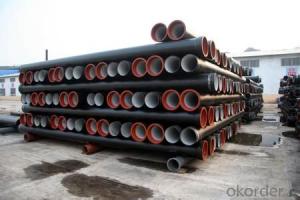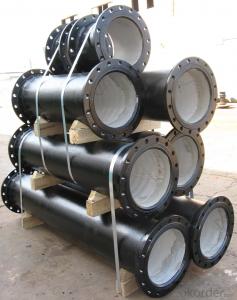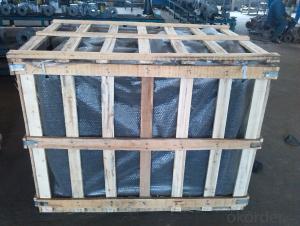DUCTILE IRON PIPE C DN 450
- Loading Port:
- Tianjin
- Payment Terms:
- TT OR LC
- Min Order Qty:
- -
- Supply Capability:
- 30000Tons m/month
OKorder Service Pledge
OKorder Financial Service
You Might Also Like
CNBM ductile iron pipe ranges from DN80-DN1600mm (T-Type, Class K9), effective length 6m, comply with ISO2531 Standard
Company Profile
CNBM International Corporation is the leading production base and renowned supplier of Ductile Iron Water Pipe systems of both potable and waste water in China. We are constantly looking to develop high quality products to ensure the longest service life and wonderful performance.
CNBM Pipelines regard quality as the essential factor leading to successful business. Every pipe is tested in accordance with BS EN545 (water application) or BS EN598 (sewer application). CNBM Pipelines products comply with and are tested according to the relevant European and International Standards. Our pipes are manufactured under the quality management system BS EN ISO 9001. After years of efforts, CNBM Pipelines has built up great reputation in terms of quality and service among customers worldwide
Product Introduction
CNBM ductile iron pipe ranges from DN80-DN1600mm (Tyton, T-Type, Class K7/K8/K9), effective length: 6m, complying with BS EN545/EN598/ISO2531/BS4772.
Specification& Payment terms
Internal lining: Pipes shall have an internal cement mortar lining in acc with ISO4179.
External coating: Pipes shall be externally coated with metallic zinc spray plus a further layer of resin painting to ISO8179.
Gasket: 100% SBR/NBR/EPDM gasket in accordance with ISO4633.
Packing: Pipes from DN100 to DN300 be bundled with steel belts, the others are in bulk.
Payment term: By 30% T/T advance payment + 70% Irrevocable L/C at sight.
Packing: In bulk vessel or in container.
- Q: Are ductile iron pipes suitable for use in wastewater pumping stations?
- Yes, ductile iron pipes are suitable for use in wastewater pumping stations. Ductile iron is a strong and durable material that can withstand the harsh conditions and corrosive nature of wastewater. It has excellent resistance to corrosion and can handle high-pressure environments, making it an ideal choice for transporting wastewater in pumping stations. Additionally, ductile iron pipes have a long lifespan and require minimal maintenance, reducing the overall cost of operation and ensuring reliable and efficient wastewater transportation.
- Q: How do ductile iron pipes handle ground movement in earthquake-prone areas?
- Ductile iron pipes are designed to withstand ground movement in earthquake-prone areas due to their inherent strength and flexibility. The ductile nature of the iron allows the pipes to deform and absorb the seismic energy without breaking or fracturing. This ensures their durability and ability to maintain water supply and drainage systems even during seismic events. Additionally, ductile iron pipes have superior joint integrity, which further enhances their resistance to ground movement and minimizes the risk of leaks or pipe failure.
- Q: Can ductile iron pipe be used for chemical processing plant applications?
- Yes, ductile iron pipe can be used for chemical processing plant applications. Ductile iron is a type of cast iron that has enhanced properties, such as improved ductility and strength, which make it suitable for a variety of industrial applications, including chemical processing plants. Ductile iron pipes have good corrosion resistance, can withstand high temperatures and pressures, and are able to handle aggressive chemical substances. Additionally, ductile iron pipes are easy to install and maintain, making them a cost-effective choice for chemical processing plants. However, it is important to consider the specific requirements and conditions of the chemical processing plant when selecting piping materials, and consult with experts to ensure that the chosen materials are suitable for the specific chemical processes and substances involved.
- Q: What are the typical bedding and backfill requirements for ductile iron pipes?
- The typical bedding and backfill requirements for ductile iron pipes involve using a granular material, such as sand or gravel, to provide proper support and cushioning for the pipe. The bedding material should be placed evenly around the entire circumference of the pipe, ensuring that it is in direct contact with the bottom of the pipe and extending to a certain height above it. Backfill material, on the other hand, is used to fill the remaining space around the pipe and should be placed in layers and compacted to prevent settlement. Additionally, proper compaction and compaction equipment should be used to ensure the stability and long-term performance of the ductile iron pipes.
- Q: What is the expected surge pressure rating of ductile iron pipes?
- The expected surge pressure rating of ductile iron pipes can vary depending on various factors such as the diameter and thickness of the pipe, the type of joint used, and the specific manufacturer's specifications. However, ductile iron pipes are generally designed to withstand surge pressures between 150% to 200% of their working pressure rating. This means that if a ductile iron pipe has a working pressure rating of, for example, 250 psi, it can typically handle surge pressures of up to 375 psi to 500 psi. It is important to consult the manufacturer's specifications and guidelines for accurate surge pressure ratings specific to the ductile iron pipes being used.
- Q: Why does the cast iron pipe always run off when testing?
- The pipeline is installed, straight section of each pipe will be added pier, concrete pipe, elbow, three links should also have concrete pier, specific installation method according to GB Atlas 03SS515, and the straight pipe to soil, pipeline interface will be exposed, easy to check.
- Q: How are ductile iron pipes tested for quality assurance?
- Ductile iron pipes undergo various testing procedures to ensure their quality and meet industry standards. These quality assurance tests are conducted on both raw materials and finished products to ensure the durability, strength, and overall reliability of ductile iron pipes. One of the initial tests is the chemical analysis of the raw materials used in manufacturing the pipes. This analysis ensures that the composition of the iron, carbon, and other elements is within the specified range, as different compositions can affect the pipe's strength and corrosion resistance. Next, mechanical tests are performed to evaluate the strength and ductility of the pipes. Tensile tests are conducted to determine the ultimate tensile strength, yield strength, and elongation properties of the pipe. This helps in assessing the pipe's ability to withstand external pressure or bending forces. Additionally, impact tests are performed to evaluate the pipe's resistance to sudden loading or impact. This test measures the energy absorbed by the pipe when subjected to a high impact force, ensuring that it can withstand potential accidental impacts during installation or operation. Another critical test is the hydrostatic pressure test, which checks the pipes' ability to withstand internal pressure. In this test, the pipes are filled with water and subjected to a specified pressure for a specific duration. This ensures that the pipes can withstand the expected operating pressure without any leakage or failure. Furthermore, dimensional and visual inspections are conducted to ensure that the pipes meet the required specifications. These inspections include checking the pipe's outer diameter, length, wall thickness, and overall appearance for any defects, such as cracks, voids, or irregularities. Lastly, corrosion resistance tests are performed to assess the pipe's ability to resist corrosion when exposed to different environments or fluids. This helps in determining the expected lifespan of the pipes and their suitability for various applications. Overall, these quality assurance tests play a crucial role in ensuring that ductile iron pipes meet the required standards and provide reliable and long-lasting performance in various infrastructure projects.
- Q: Is there any cast iron pipe used in the fire hose?
- I do not know, are generally seamless steel pipe or spiral pipe, straight seam pipe.
- Q: Are ductile iron pipes suitable for use in wastewater treatment plants?
- Yes, ductile iron pipes are suitable for use in wastewater treatment plants. Ductile iron has excellent corrosion resistance, high strength, and durability, making it ideal for handling the harsh and corrosive environment found in wastewater treatment plants. Additionally, ductile iron pipes have a long lifespan and can withstand the high-pressure demands of wastewater systems, making them a reliable choice for this application.
- Q: How are ductile iron pipes protected against erosion caused by high-velocity flow?
- Various methods and techniques are used to protect ductile iron pipes from erosion caused by high-velocity flow. One effective method involves applying protective coatings on the inner surface of the pipes. These coatings act as a barrier between the flowing water and the pipe material, minimizing the abrasive effects of the fast flow. Depending on the specific requirements of the application, coatings such as epoxy, polyurethane, or cement-mortar lining may be used. In addition, manufacturers often design the pipes with increased wall thickness in areas prone to erosion, such as bends or sections with high flow velocity. This additional thickness provides extra strength and resistance against erosion. Another technique used to safeguard ductile iron pipes from erosion is the implementation of flow control devices, such as flow deflectors or fittings that reduce velocity. These devices help redirect the flow and decrease its speed, thus minimizing the impact on the pipe walls. Regular maintenance and inspections are also vital to prevent erosion. By monitoring the condition of the pipes and identifying any early signs of erosion, appropriate measures can be taken to address the issue before it worsens. This may involve repairing or replacing damaged sections of the pipes and implementing erosion control measures like sediment filters or flow restrictors. Overall, a combination of protective coatings, design considerations, flow control devices, and proactive maintenance strategies are employed to ensure adequate protection of ductile iron pipes against erosion caused by high-velocity flow.
Send your message to us
DUCTILE IRON PIPE C DN 450
- Loading Port:
- Tianjin
- Payment Terms:
- TT OR LC
- Min Order Qty:
- -
- Supply Capability:
- 30000Tons m/month
OKorder Service Pledge
OKorder Financial Service
Similar products
Hot products
Hot Searches
Related keywords
